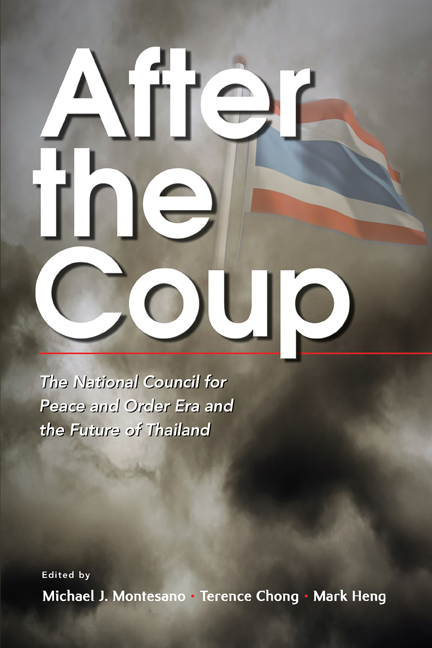Book contents
- Frontmatter
- Contents
- About the Contributors
- 1 Introduction: Thai Realities and Possibilities after the 22 May Coup
- 2 The Rise of the Thai Upper Middle Class and its Turn against Democracy
- 3 “We the Southerners Come to Protect the Nation and the King”: Southerners’ Political Rise and Regional Nationalism in Thailand
- 4 Exit, Voice, (Dis)loyalty? Northeast Thailand after the 2014 Coup
- 5 The Red Shirts and their Democratic Struggle in Northern Thailand, April 2010 – May 2015
- 6 The Shifting Battleground: Peace Dialogue in Thailand's Malay-Muslim South
- 7 Thailand's Zigzag Road to Democracy: Continuity and Change in Military Intervention
- 8 Murder and Regress: Violence and Political Change in Thailand
- 9 Thailand's Politics of Decentralization: Reform and Resistance before and after the May 2014 Coup
- 10 Change and Continuity in the Politics of the Media after the Coup
- 11 Thailand's Royal Democracy in Crisis
- 12 The Foreign Press and its Changing Perceptions of the Thai Monarchy
- 13 Thai Economic Growth: Retrospect and Prospect
- 14 Features and Challenges of an Ageing Population in Thailand
- 15 Conclusion: Thailand in Transition
- Bibliography
- Index
5 - The Red Shirts and their Democratic Struggle in Northern Thailand, April 2010 – May 2015
Published online by Cambridge University Press: 23 May 2019
- Frontmatter
- Contents
- About the Contributors
- 1 Introduction: Thai Realities and Possibilities after the 22 May Coup
- 2 The Rise of the Thai Upper Middle Class and its Turn against Democracy
- 3 “We the Southerners Come to Protect the Nation and the King”: Southerners’ Political Rise and Regional Nationalism in Thailand
- 4 Exit, Voice, (Dis)loyalty? Northeast Thailand after the 2014 Coup
- 5 The Red Shirts and their Democratic Struggle in Northern Thailand, April 2010 – May 2015
- 6 The Shifting Battleground: Peace Dialogue in Thailand's Malay-Muslim South
- 7 Thailand's Zigzag Road to Democracy: Continuity and Change in Military Intervention
- 8 Murder and Regress: Violence and Political Change in Thailand
- 9 Thailand's Politics of Decentralization: Reform and Resistance before and after the May 2014 Coup
- 10 Change and Continuity in the Politics of the Media after the Coup
- 11 Thailand's Royal Democracy in Crisis
- 12 The Foreign Press and its Changing Perceptions of the Thai Monarchy
- 13 Thai Economic Growth: Retrospect and Prospect
- 14 Features and Challenges of an Ageing Population in Thailand
- 15 Conclusion: Thailand in Transition
- Bibliography
- Index
Summary
The deaths of people [at Bangkok's Ratchadamnoen Avenue and Ratchaprasong Intersection] during April and May 2010 brought about “eye-opening” among villagers. They have now understood how the state is ready to use violence and suppress its people … that the state sees the people's demonstration not just as a call for democracy, but as war. The state sees people as its enemy and intends to destroy them. The killings in Bangkok have transformed those villagers to be fighters who are ready to die for democracy. (Pinkaew 2013, p. 55)
Throughout 2013 and the early part of the following year, the political excitement resulting from each huge Red Shirt demonstration, both in Bangkok and beyond, in support of the elected Yingluck Shinawatra government, led many observers to believe that the Red Shirt movement was a strong democratic force, particularly in the Northeastern and Northern regions of Thailand. These observers believed that the movement was ready to oppose the return of an authoritarian regime by any means, and that the establishment of a government in exile or a division of the country to set up a Federation of Isan-Lanna States or Sahaphan rat isanlanna would be an option if a military coup were staged.
A study of peasants in rural Chiang Mai published by Andrew Walker in 2012, and drawing on fieldwork undertaken since 2005, presented a vivid picture of the transformation both of villager-farmers’ outlooks and of rural politics since Thaksin's Thai Rak Thai Party came to power in 2001. It documents many peasants’ dissatisfaction with the coup (Walker 2012, p. 209). In addition, two often-quoted works on the Red Shirts in Northeast and Northern Thailand, the first written in November 2013 and published in 2014 (Pinkaew 2013, pp. 51–60) and the second released in September 2014 (Keyes 2014, pp. 175–94), seem to confirm notions concerning the strong political activism of the Red Shirt villagers in these two regions. According to the two studies, especially Pinkaew's, villagers had risen up, had become politically active citizens and brave fighters for democracy, and were ready to protect democracy and to sacrifice their lives for the cause.
- Type
- Chapter
- Information
- After the CoupThe National Council for Peace and Order Era and the Future of Thailand, pp. 114 - 139Publisher: ISEAS–Yusof Ishak InstitutePrint publication year: 2019

